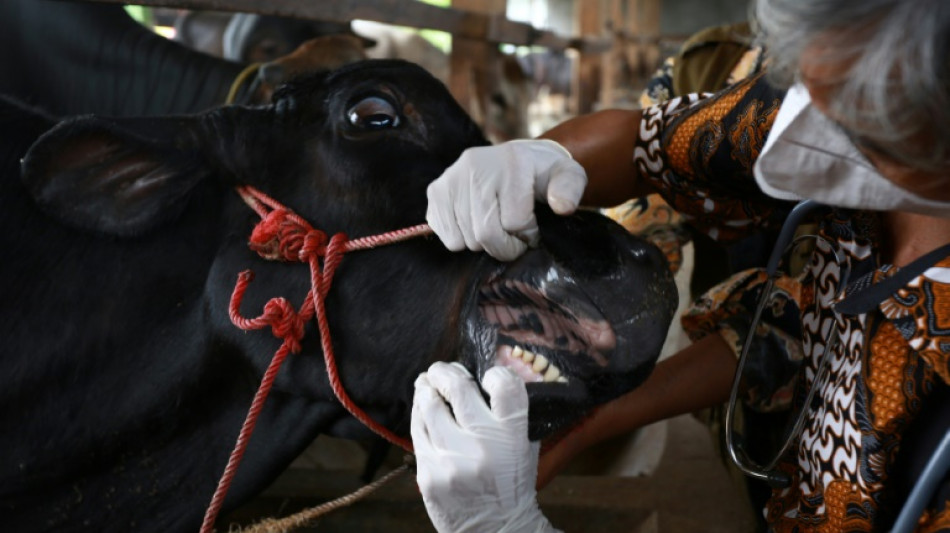
-
 Merino brace sends Arsenal past Slavia in Champions League
Merino brace sends Arsenal past Slavia in Champions League
-
Djokovic makes winning return in Athens

-
 Napoli and Eintracht Frankfurt in Champions League stalemate
Napoli and Eintracht Frankfurt in Champions League stalemate
-
Arsenal's Dowman becomes youngest-ever Champions League player

-
 Cheney shaped US like no other VP. Until he didn't.
Cheney shaped US like no other VP. Until he didn't.
-
Pakistan edge South Africa in tense ODI finish in Faisalabad

-
 Brazil's Lula urges less talk, more action at COP30 climate meet
Brazil's Lula urges less talk, more action at COP30 climate meet
-
Barca's Lewandowski says his season starting now after injury struggles

-
 Burn urges Newcastle to show their ugly side in Bilbao clash
Burn urges Newcastle to show their ugly side in Bilbao clash
-
French pair released after 3-year Iran jail ordeal

-
 Getty Images largely loses lawsuit against UK AI firm
Getty Images largely loses lawsuit against UK AI firm
-
Cement maker Lafarge on trial in France over jihadist funding

-
 Sculpture of Trump strapped to a cross displayed in Switzerland
Sculpture of Trump strapped to a cross displayed in Switzerland
-
Pakistan's Rauf and Indian skipper Yadav punished over Asia Cup behaviour

-
 Libbok welcomes 'healthy' Springboks fly-half competition
Libbok welcomes 'healthy' Springboks fly-half competition
-
Reeling from earthquakes, Afghans fear coming winter

-
 Ronaldo reveals emotional retirement will come 'soon'
Ronaldo reveals emotional retirement will come 'soon'
-
Munich's surfers stunned after famed river wave vanishes

-
 Iran commemorates storming of US embassy with missile replicas, fake coffins
Iran commemorates storming of US embassy with missile replicas, fake coffins
-
Gauff sweeps Paolini aside to revitalise WTA Finals defence

-
 Shein vows to cooperate with France in probe over childlike sex dolls
Shein vows to cooperate with France in probe over childlike sex dolls
-
Young leftist Mamdani on track to win NY vote, shaking up US politics

-
 US government shutdown ties record for longest in history
US government shutdown ties record for longest in history
-
King Tut's collection displayed for first time at Egypt's grand museum

-
 Typhoon flooding kills over 40, strands thousands in central Philippines
Typhoon flooding kills over 40, strands thousands in central Philippines
-
Trent mural defaced ahead of Liverpool return

-
 Sabalenka to face Kyrgios in 'Battle of Sexes' on December 28
Sabalenka to face Kyrgios in 'Battle of Sexes' on December 28
-
Experts call for global panel to tackle 'inequality crisis'
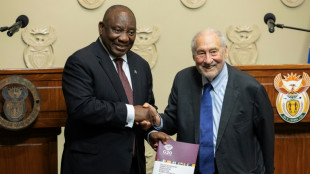
-
 Backed by Brussels, Zelensky urges Orban to drop veto on EU bid
Backed by Brussels, Zelensky urges Orban to drop veto on EU bid
-
After ECHR ruling, Turkey opposition urges pro-Kurd leader's release

-
 UK far-right activist Robinson cleared of terror offence over phone access
UK far-right activist Robinson cleared of terror offence over phone access
-
World on track to dangerous warming as emissions hit record high: UN
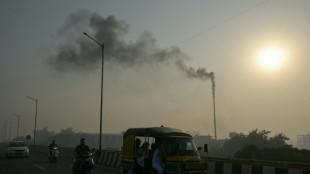
-
 Nvidia, Deutsche Telekom unveil 1-bn-euro AI industrial hub
Nvidia, Deutsche Telekom unveil 1-bn-euro AI industrial hub
-
Which record? Haaland warns he can get even better

-
 Football star David Beckham hails knighthood as 'proudest moment'
Football star David Beckham hails knighthood as 'proudest moment'
-
Laurent Mauvignier wins France's top literary award for family saga

-
 Indian Sikh pilgrims enter Pakistan, first major crossing since May conflict
Indian Sikh pilgrims enter Pakistan, first major crossing since May conflict
-
Former US vice president Dick Cheney dies at 84

-
 Fiorentina sack Pioli after winless start in Serie A
Fiorentina sack Pioli after winless start in Serie A
-
Oscar-winning Palestinian films daily 'Israeli impunity' in West Bank
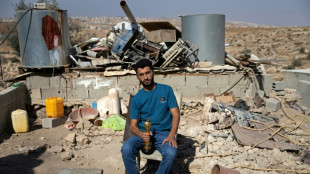
-
 Spain's Telefonica shares drop on dividend cut, net loss
Spain's Telefonica shares drop on dividend cut, net loss
-
Fierce mountain storms kill nine in Nepal
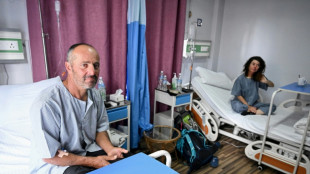
-
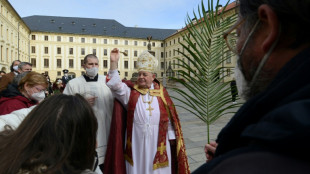 Divisive Czech cardinal Dominik Duka dies at 82
Divisive Czech cardinal Dominik Duka dies at 82
-
Shein vows to cooperate with France in sex doll probe

-
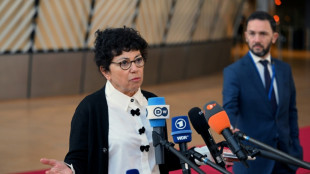 EU in last-ditch push to seal climate targets before COP30
EU in last-ditch push to seal climate targets before COP30
-
Finnish ex-PM Marin says her female cabinet faced torrent of sexism

-
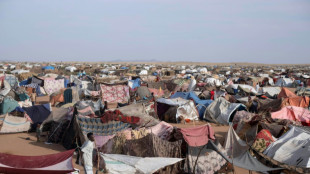 Sudan army-backed council to meet on US truce proposal: govt source
Sudan army-backed council to meet on US truce proposal: govt source
-
BP profit surges despite lower oil prices

-
 Shein vows to cooperate with France in childlike sex doll probe
Shein vows to cooperate with France in childlike sex doll probe
-
National hero proposal for Indonesia's Suharto sparks backlash


Indonesian farmers pay price of foot and mouth outbreak before Eid sacrifice
Indonesian farmer Okky Pratama usually sells dozens of cattle for Eid al-Adha, making his biggest earnings around the Islamic day of sacrifice, but this year he has sold just five.
A foot-and-mouth disease outbreak has ripped through two Indonesian provinces since April, killing thousands of cows and infecting hundreds of thousands more, raising consumer fears before the July 10 festival.
Clusters of the highly infectious animal virus in East Java and Aceh provinces have rattled cattle farmers and their output during the most profitable time of year in a country with the world's biggest Muslim population.
"I am pessimistic about the sales. Regular buyers unusually did not send me any purchase inquiries," said Pratama, whose cow farm in the mountainous Batu City is situated in the hardest-hit East Java province.
"When I contacted them, they said they did not (want to) sacrifice any livestock this year because of the foot-and-mouth disease."
Profits from the holiday season -- around 60 million rupiah ($4,000) -- account for 75 percent of his annual earnings, 31-year-old Pratama told AFP.
But he has so far lost two of his cattle to the disease -- which was first detected in early May.
Thirty-three others were infected but recovered after intensive care.
As of July 6, the disease had spread to 21 provinces across Indonesia and infected more than 320,000 livestock, according to official data.
Over 2,100 of them have died from the disease.
- Sales struggle -
Indonesia had been outbreak-free for 30 years, but farmers are reeling from a fresh blow to their business after the coronavirus pandemic shuttered restaurants and food stalls.
Cow-farmer Masrizal said he has struggled to sell his cattle because of sluggish demand for meat and shuttered livestock markets in Aceh province.
"As markets are closed, I had to proactively offer the sacrificial livestock to mosques and people in villages," he said.
The disease specifically attacks cloven-hoofed animals such as cattle, swine, sheep and goats, and the policy in Europe -- such as during the British outbreak in 2001 -– has typically been to slaughter herds of animals as a precaution.
But farmers in Indonesia are trying to keep their precious assets alive despite the risk of the disease spreading through close contact between animals, contaminated feed and farm equipment.
Animals infected by the disease usually lose their appetite and temporarily cannot walk as they develop blisters inside the mouth and on the feet.
- Swift vaccination key -
The government has stepped in, setting up a task force and ordering the culling of more than 2,800 livestock.
The country's religious affairs minister has told Muslims they "should not force themselves" to sacrifice cattle during the outbreak.
Suharyanto, the head of the government's new task force, compared the outbreak to the Covid-19 pandemic, and Jakarta said it would attempt to administer 800,000 vaccine shots to healthy cattle by July 7, before the day of sacrifice.
"As long as the livestock are well-treated and well-fed, God willing, they can recover," the agriculture ministry's director of livestock production Agung Suganda said in a webinar last week.
Suharyanto said small farmers whose cattle were culled will receive up to 10 million rupiah ($666) in compensation -- well short of the thousands of dollars farmers earned from Eid sales last year.
And the cancellation of pre-outbreak orders and demands for refunds have left farmers with "extraordinary" losses, the Indonesian Cattle and Buffalo Breeders Association (PPSKI) chairman Nanang Purus Subendro said.
"We need to accelerate the process because we are in a race against the virus."
C.Meier--BTB




